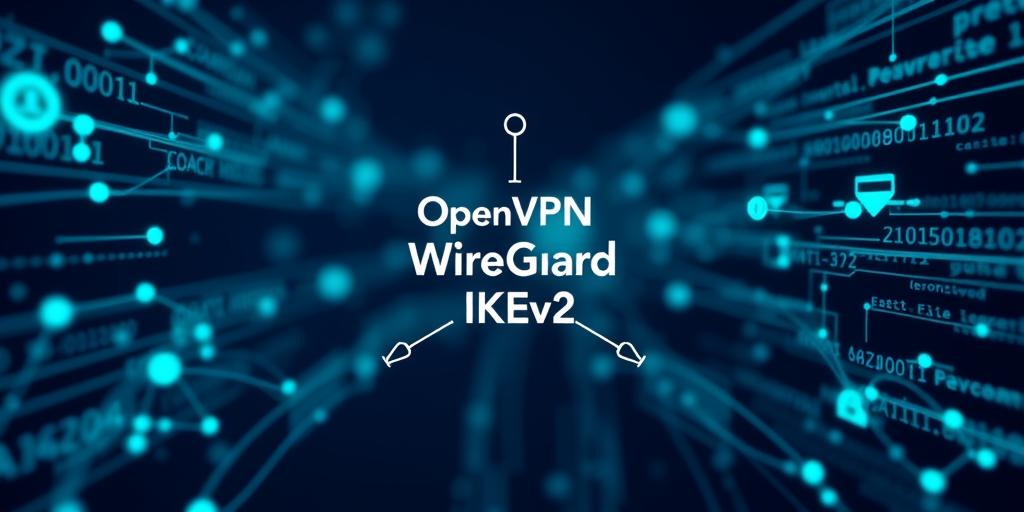VPN Protocols Demystified: OpenVPN, WireGuard, IKEv2 – Which is Best?
In the realm of online security and privacy, Virtual Private Networks (VPNs) are indispensable tools. However, the effectiveness of a VPN heavily relies on the protocol it uses. This post will delve into three prominent VPN protocols: OpenVPN, WireGuard, and IKEv2, providing a clear understanding of their strengths, weaknesses, and ideal use cases.
Understanding VPN Protocols
A VPN protocol is a set of rules that dictates how data is transmitted between your device and the VPN server. It governs the encryption method, authentication process, and connection stability. Choosing the right protocol can significantly impact your VPN experience, affecting speed, security, and reliability.
OpenVPN: The Veteran Workhorse
Overview: OpenVPN is a widely used, open-source protocol known for its reliability and security. It supports a variety of encryption algorithms, making it highly configurable.
Pros:
- Security: OpenVPN is renowned for its robust security features. It supports strong encryption algorithms like AES and offers protection against various attacks.
- Flexibility: It can operate over both TCP and UDP ports, providing flexibility in different network environments.
- Open Source: Being open source, OpenVPN's code is publicly audited, enhancing its trustworthiness.
Cons:
- Speed: OpenVPN can be slower compared to newer protocols like WireGuard, especially when using TCP.
- Complexity: Its extensive configuration options can be daunting for novice users.
Ideal Use Case: OpenVPN is an excellent choice for users who prioritize security and reliability and are willing to sacrifice some speed. It’s suitable for bypassing censorship and protecting sensitive data.
WireGuard: The Modern Speedster
Overview: WireGuard is a relatively new protocol designed with simplicity and speed in mind. It uses state-of-the-art cryptography and a streamlined codebase.
Pros:
- Speed: WireGuard offers significantly faster speeds compared to OpenVPN and IKEv2, thanks to its efficient code and modern cryptography.
- Security: Despite its simplicity, WireGuard provides robust security using modern encryption algorithms.
- Ease of Use: Its smaller codebase makes it easier to audit and maintain, reducing the potential for vulnerabilities.
Cons:
- Maturity: Being newer, WireGuard hasn't been as extensively tested as OpenVPN.
- Privacy Concerns: WireGuard's design requires storing user IP addresses on the server, raising some privacy concerns, although this can be mitigated with proper configuration.
Ideal Use Case: WireGuard is perfect for users who need high speeds for streaming, gaming, and downloading, without compromising on security. It's also a good choice for mobile devices due to its efficient battery usage.
IKEv2/IPsec: The Mobile Warrior
Overview: IKEv2 (Internet Key Exchange version 2) is often paired with IPsec (Internet Protocol Security) to create a secure VPN connection. It is known for its stability and ability to quickly re-establish connections.
Pros:
- Stability: IKEv2 excels at maintaining stable connections, especially on mobile devices that switch between networks frequently.
- Speed: It offers good speeds, although generally not as fast as WireGuard.
- Security: IKEv2/IPsec provides strong encryption and authentication.
Cons:
- Firewall Issues: Some firewalls may block IKEv2/IPsec connections.
- Less Flexible: It is less configurable compared to OpenVPN.
Ideal Use Case: IKEv2/IPsec is well-suited for mobile users who need a reliable and secure connection on the go. It's also a good option for businesses needing to establish secure connections between offices.
Comparison Table
| Feature | OpenVPN | WireGuard | IKEv2/IPsec | | :------------ | :------------------------------------ | :------------------------------------ | :------------------------------------ | | Speed | Moderate | Fast | Good | | Security | High | High | High | | Stability | Good | Good | Excellent | | Flexibility | High | Moderate | Low | | Use Case | Security-focused, Bypassing Censorship | Speed-focused, Streaming, Gaming | Mobile Use, Stable Connections |
Conclusion
Choosing the best VPN protocol depends on your specific needs and priorities. OpenVPN offers robust security and flexibility, making it ideal for users who prioritize privacy and are willing to sacrifice some speed. WireGuard excels in speed and efficiency, perfect for streaming and gaming. IKEv2/IPsec provides stable connections, making it a great choice for mobile users. By understanding the strengths and weaknesses of each protocol, you can make an informed decision and enhance your online security and privacy.









